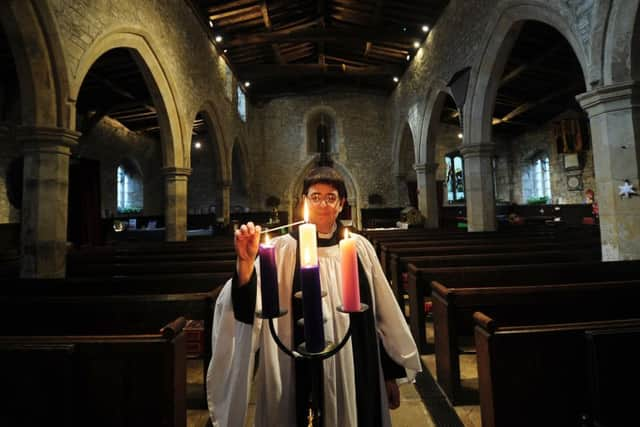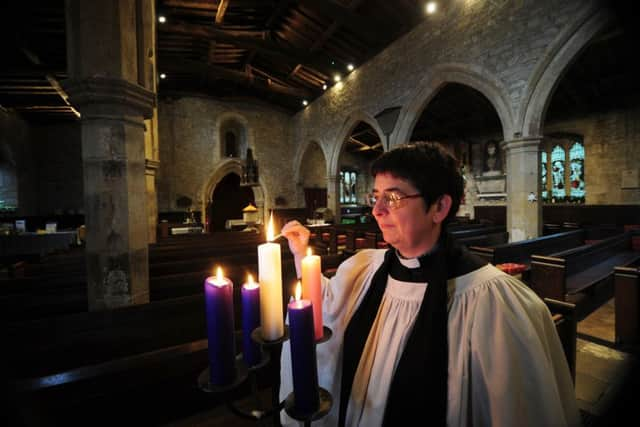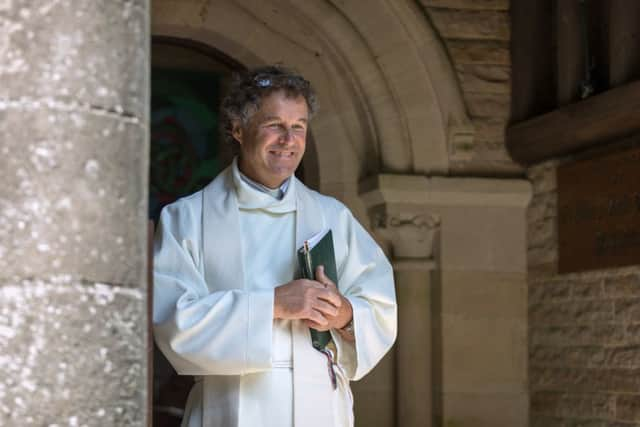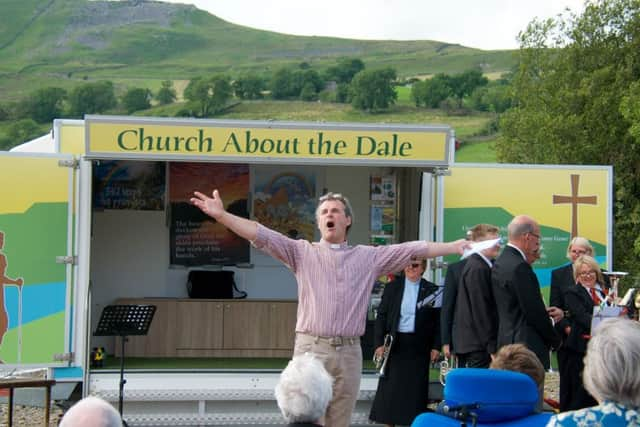Meet the Yorkshire Dales vicars heading out on Christmas Eve safaris after year of flooding nightmare
It will be a Christmas with a difference this year for the Reverend Caroline Hewlett, Vicar of Swaledale with Arkengarthdale. She is living in a holiday cottage on a temporary basis after being among the many victims in the area of the terrible flooding that affected much of the Yorkshire Dales in late July.
Her vicarage in Swaledale was hit by four feet of water rushing inside in a 45-minute period, leaving furniture floating around as the water reached the height of the windowsills, while her garden shed was washed away.
Advertisement
Hide AdAdvertisement
Hide Ad“The vicarage was completely flooded out and everything on the ground floor was lost,” she explains. “There were over 100 houses and 40 farms that were hit nearby. Very often at church services at this time, I do a review of the year and it has been a difficult year.


“People have been amazing and really pulled together. I stayed in people’s spare bedrooms for seven weeks while trying to run the parish. People have been so kind.
“Flood recovery work is a long-term process, In 1986, it took four years to do things like putting stone walls back.”
Advertisement
Hide AdAdvertisement
Hide AdIt is not the first time the vicarage had been hit by flooding, having also been affected by torrential rain during Hurricane Charley in 1986 and the events of July have accelerated plans by the Church of England to find a more suitable property.


“I’m not going back to the vicarage I was in, there had been a previous decision it wasn’t suitable because of the flood risk but we became a new diocese and the move never quite happened. Now they are going to buy a new vicarage.”
Despite the personal challenges, life as a rural vicar has had to go on – particularly at this festive time of year.
The four churches Hewlett is responsible for will collectively host a Christmas Eve carol service, a 10pm communion and a midnight communion today, with two more services on Christmas Day.
Advertisement
Hide AdAdvertisement
Hide AdHewlett has the help of her curate Alison Stewart Smith this year with the Christmas services, but has done them on her own in the past and may be facing a similar situation in 2020 as Stewart Smith is moving to Durham to become priest in charge of the parishes of Ryton and Winlaton.


Having previously been a curate at St George’s in inner-city Leeds, Hewlett has now been in the Yorkshire Dales for 14 years. She says the key to this time of year is preparation.
“At the beginning of September, I do a great big list of all the Christmas services and work out things like ‘do we have enough notice sheets’. By October, a lot of things are in hand,” she explains.
But she adds that her sermons are often refined close to the time to touch on newsworthy events such as the recent election result.
Advertisement
Hide AdAdvertisement
Hide Ad“I try and reflect on what is going on in people’s lives and link up to the Bible passages we are covering for that service.


“It is amazing how often the readings we get say something about the current situation in the world.”
In common with many rural vicars, Hewlett relies on a four-wheel drive to get her around her parish and she has even taken a course in off-road driving in the past.
“People always say it is your busy period but most years Holy Week and Lent are just as busy. People don’t always see what we do the rest of the year.
Advertisement
Hide AdAdvertisement
Hide Ad“People come out to church services at this time of year who don’t come regularly go to church on Sundays. Christingle services are great fun and on Christmas Eve and Christmas Day we have got quite a big holiday cottage industry up here so that adds to the congregation.”
She says she is thankful it has been a mild winter so far this year.
“We are really glad it doesn’t look like it is going to snow. People get quite upset if you mess up their Christmas services. If you have to cancel a service in February nobody will care!
“Ice is really the worst, I went off the road in the ice a couple of years ago.”
Advertisement
Hide AdAdvertisement
Hide AdBecause of the evolving make-up of the local community, with fewer young families, Hewlett has introduced things like a Christmas jumper service in a bid to increase church attendance.
“We are trying to keep the message fresh.”
Another Dales vicar on a similar mission this Christmas is the Reverend David Clark, who has responsibility for four churches in Askrigg, Hardraw, Hawes and Stalling Busk in Upper Wensleydale.
“I call it my Christmas Eve safari,” Clark says of his duties today. “I will start at the morning with a community service at a local residential home then just after 3pm I head over for a Christingle service at one church, then another for a communion service at 7.15pm then Carols by Candlelight at 8pm then another church for 10pm for communion then another church at 11.30pm for midnight communion.
“It can be a bit like the Vicar of Dibley – you get fed at the various points along the way. There are lots of mince pies and you have to be careful with consumption of the communion wine! It is a lovely special time driving around Wensleydale which is just gorgeous.”
Advertisement
Hide AdAdvertisement
Hide AdHe says the Carols by Candlelight service at Stalling Busk can be a particularly moving occasion. “It is only a small place but being lit up with candles and absolutely rammed with 30 to 40 people makes for a special time. On Christmas Day I just have one service at 10.30am and my colleague will take another service. The churches are not too far apart. I take a flask of coffee to keep me awake and my wife will come with me. We also try and get to folks who can’t get to the services.”
Clark says while Dales life has its challenges, particularly with the paucity of public transport, the sense of community is extraordinary. “There is an independence and a true Yorkshire spirit that we will get on with it and get things done.”
He says on just one afternoon this month, he was contacted by one lady asking him if they knew of anyone alone at Christmas who might want to share their Christmas dinner with her family, as well as another lady linked to a local farm seeking suggestions for people they could donate turkeys to.
Having previously been a schoolteacher in West Yorkshire for 32 years before serving a curacy in the same region, he moved to the Dales three years ago and says it is a “glorious privilege” to be working in such a beautiful part of the world, especially at this time of year.
Advertisement
Hide AdAdvertisement
Hide Ad“Christmas is certainly a busy time. But it is very special, folks seem much more open and willing to ponder the extraordinary and the extraordinary things about God at this time of year. It is a very rare a day goes by when I am not just thanking God for placing me here.
“When you are driving around the countryside and seeing the stars on Christmas Eve, you think of what that first Christmas must have been like.”
Battle to keep rural churches alive
David Clark admits it is a challenge to keep rural churches open after the Bishop of Ripon recently admitted many of the historic buildings are both a “blessing and a burden” for communities.
He says: “I have got four buildings I am responsible for in a 90 square mile radius. The buildings are very special because they are a sign of God’s presence in the community.
Advertisement
Hide AdAdvertisement
Hide Ad“But yes they can become a burden for the small groups of people who look after them. We do want to keep the buildings open but there are challenges associated with that. There are Grade I and II-listed buildings that require enormous amounts of care and attention.
“It is not the building that is the church, it is the people who come into it.”